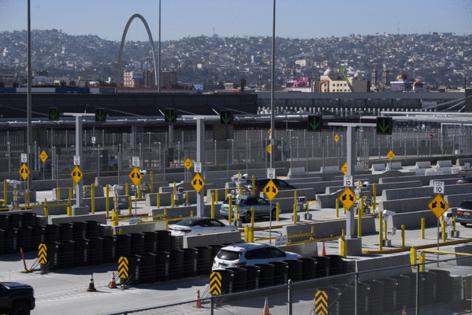San Diego lawsuit challenges shutdown of asylum processing at US-Mexico border crossings
Published in News & Features
SAN DIEGO — Two San Diego legal-service providers and 11 foreign nationals who wish to seek asylum in the United States filed a federal lawsuit this week in San Diego arguing the Trump administration has illegally shut down access to asylum at ports of entry along the U.S.-Mexico border.
The class-action claims largely revolve around President Donald Trump’s actions on Inauguration Day, when he canceled asylum screening appointments made through the government’s CBP One application and then directed the Department of Homeland Security to cease use of the app, which had been launched by the Biden administration. That left migrants in Tijuana devastated as the appointments they’d waited months for were suddenly eliminated.
The Trump administration “pulled the rug out from under people who had made drastic and costly decisions in reliance on the processing requirements the Government had created,” the lawsuit, filed Wednesday, alleged. The plaintiffs argued that Trump and his administration have “established barriers that made it effectively impossible” for the plaintiffs and other similarly situated asylum seekers to access the asylum process at ports of entry.
Skye Perryman, the president and CEO of Democracy Forward, one of the organizations representing the plaintiffs, said Trump has essentially abandoned “asylum seekers fleeing dangerous circumstances in fear for their lives in an unlawful overreach that imperils thousands of people — including children — in dire circumstances.”
“America has offered refuge for those seeking asylum for the past half-century. This administration cannot undermine our democratic values and rights enshrined in U.S. law with a stroke of the pen,” Perryman said.
The lawsuit names as defendants Trump, DHS Secretary Kristi Noem, Secretary of State Marco Rubio, Attorney General Pamela Bondi and two acting officials from U.S. Customs and Border Protection. DHS did not immediately respond to a request for comment late Wednesday afternoon.
The plaintiffs in the case include citizens of Mexico, Colombia, Venezuela, Afghanistan, Haiti, Russia, Guatemala and Ecuador. Among their harrowing stories, one woman from Mexico alleges she’s been repeatedly kidnapped by a notoriously violent cartel for cooperating with authorities in the murder investigation of her first husband. She alleges the cartel disappeared her son, daughter-in-law and 2-year-old granddaughter. The suit alleges that she and her second husband had a Feb. 9 appointment for an asylum screening at the San Ysidro Port of Entry, but it was canceled on Inauguration Day.
The lawsuit asserts that each of the plaintiffs — including a Haitian man who was in line for his scheduled CBP One appointment when it was suddenly canceled on Inauguration Day — “intends to seek protection in the United States” by presenting themselves at U.S.-Mexico ports of entry, but the defendants’ actions have “shut down all access to asylum at (ports of entry), leaving (them) with no method of seeking protection.”
Also named as plaintiffs are Al Otro Lado, which is headquartered in Los Angeles but has offices in San Diego and Tijuana, and the Haitian Bridge Alliance, which is based in San Diego. Both organizations provide legal and humanitarian aid to asylum seekers and allege that the actions of defendants “have thwarted (their) ability to carry out (their) core activities.”
The lawsuit contends that under U.S. law, migrants are supposed to be able to seek asylum if they arrive in the U.S. or at a port of entry and have a “credible fear of persecution” if returned to their home countries. The lawsuit contends that since Trump first took office in 2016, the executive branch has “concocted one policy experiment after another to curtail access to asylum.”
Among the policies noted in the lawsuit is the practice of “metering,” or turning back asylum seekers and forcing them to wait in Mexico to be processed at a later time. That practice first began under the Obama administration and was later formalized by the Trump administration. A San Diego federal judge later declared it unconstitutional in a ruling upheld by the 9th U.S. Circuit Court of Appeals.
Then came Title 42, a public health order issued by the first Trump administration that was used to block asylum seekers and other migrants from entering the U.S. during the COVID-19 pandemic. When the Biden administration ended Title 42 in May 2023, it began relying almost exclusively on the CBP One app that was implemented in January 2023.
The app had its issues — it was only available in certain languages and it often took asylum seekers months of trying to successfully schedule an appointment — but nearly a million migrants scheduled screening appointments through the app between January 2023 and December 2024. At the San Diego-Tijuana border, about 400 people with confirmed appointments were admitted each day.
On Trump’s first day back in the White House, he issued an executive order titled “Securing Our Borders” that ended the use of the CBP One app, among many other anti-immigration measures.
The lawsuit contends that other portions of that executive order have made it virtually impossible to seek asylum in the U.S. and constitutes an “Asylum Shutdown Policy.”
Wednesday’s lawsuit is at least the second major lawsuit to challenge the government’s asylum policies, joining one filed in February in U.S. District Court in Washington, D.C.
-------------
©2025 The San Diego Union-Tribune. Visit sandiegouniontribune.com. Distributed by Tribune Content Agency, LLC.







Comments